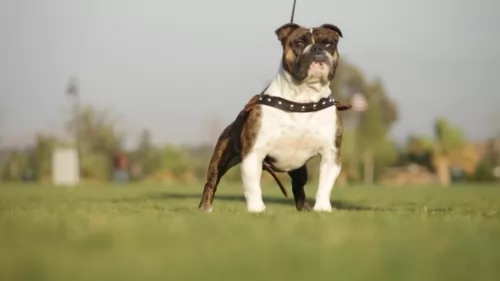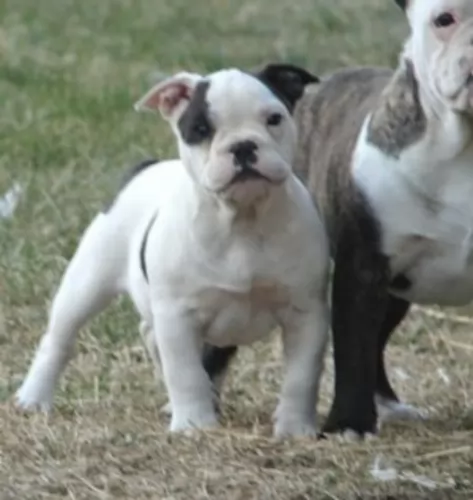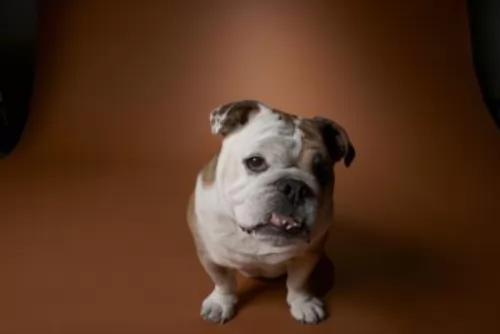 Petzlover
Petzlover Bantam Bulldog is originated from United Kingdom but Japanese Spitz is originated from Japan. Both Bantam Bulldog and Japanese Spitz are having almost same height. Bantam Bulldog may weigh 10 kg / 23 pounds more than Japanese Spitz. Both Bantam Bulldog and Japanese Spitz has almost same life span. Both Bantam Bulldog and Japanese Spitz has same litter size. Both Bantam Bulldog and Japanese Spitz requires Low Maintenance.
Bantam Bulldog is originated from United Kingdom but Japanese Spitz is originated from Japan. Both Bantam Bulldog and Japanese Spitz are having almost same height. Bantam Bulldog may weigh 10 kg / 23 pounds more than Japanese Spitz. Both Bantam Bulldog and Japanese Spitz has almost same life span. Both Bantam Bulldog and Japanese Spitz has same litter size. Both Bantam Bulldog and Japanese Spitz requires Low Maintenance.
 The origin of the Bantam Bulldog goes back to the 1800s, and in fact there is evidence of miniature bull dogs in 1899, In 1902 the smaller bulldog breed was facing extinction, so that it became necessary to import French bulldogs to England to help restore the bantam bulldog breed.
The origin of the Bantam Bulldog goes back to the 1800s, and in fact there is evidence of miniature bull dogs in 1899, In 1902 the smaller bulldog breed was facing extinction, so that it became necessary to import French bulldogs to England to help restore the bantam bulldog breed.
It was only in 2002 that the United Canine Association recognized the English bantam bulldog.
They’re the same as the ordinary bulldog except they are lighter and shorter, although there are slightly larger ones which are as tall as a regular bulldog.
The Bantam bulldogge is related to the English and French bulldogs so that the standards for the bantam breed has similarities to both types.
 Spitz dogs include quite a few dog breeds and these dogs all have similar characteristics – pointed, erect ears, slanted type eyes with thick fur.
Spitz dogs include quite a few dog breeds and these dogs all have similar characteristics – pointed, erect ears, slanted type eyes with thick fur.
The Japanese Spitz was developed by Japanese breeders at the time of the 1920s, and bringing in quite a number of dog breeds to do so. The breeders started with the white German Spitz dogs but later other white Spitz breeds were imported and crossed into this developing breed.
The final standard for the breed after World War 11 was accepted by the Japan Kennel Club. The dog became recognized by other kennel clubs of the world.
 The breed has its origins with the English bulldog, but it was in 2011 that the ‘English’ was abandoned and the name of the dog changed to Bantam Bulldogge. Short to medium in height, and with his large, square head and broad, short muzzle, the dog is short, strong, stout and compact. He had wide apart eyes, short, half-pricked, half-floppy ears and the front legs are also strong and set wide apart.
The breed has its origins with the English bulldog, but it was in 2011 that the ‘English’ was abandoned and the name of the dog changed to Bantam Bulldogge. Short to medium in height, and with his large, square head and broad, short muzzle, the dog is short, strong, stout and compact. He had wide apart eyes, short, half-pricked, half-floppy ears and the front legs are also strong and set wide apart.
He is fit and active with a playful, jovial personality. The Bantam Bulldog is completely at ease with his human family and welcomes visitors to the home. He forms strong bonds with everyone in the family and loves the presence of children in the home too. As with most other dog breeds, he does well with training and socialization – it just makes him a better dog all round. He doesn’t have a problem with accepting other pets in the home.
The coat of the Bantam is short, dense and straight with the skin being tight to the body but looser around the head and neck. Both head and face have moderate wrinkles. The coat is available in all colors and is low maintenance. A good brush twice a week won’t only remove loose hairs and keep his short coat glossy, the mere act of brushing him strengthens the bond between you as well.
 The Japanese Spitz is a small to medium sized dog, being somewhat larger than the Pomeranian. The dog stands at 25 – 38cm, both male and female and weighs anything between 5 to 10kg.
The Japanese Spitz is a small to medium sized dog, being somewhat larger than the Pomeranian. The dog stands at 25 – 38cm, both male and female and weighs anything between 5 to 10kg.
The double coat of the dog is thick and white and the puppies look like large snowball.s He has a pointed muzzle with erect ears and a tail that curls up over the back.
The pure-bred Japanese Spitz, just like other Spitz dogs are smart, inquisitive dogs who show loyalty to their owners, getting on well with children in the home and making a good family pet.
They can be quite stubborn, so training and socialization becomes important if you want him to be obedient. Training is easy as he is an intelligent, bright little dog.
They’re able to adapt to life in the city or in the country, but if you live in the city, you will need to meet his exercise needs.
He can tolerate cold weather quite well but as a companion dog, he prefers being indoors with his human family.
Even though they are small dogs, they are protective and make good watchdogs. They were bred to be companion dogs and they take this role seriously, being loyal, entertaining, fun, friendly and loving with their human family.
It is why they are becoming such a popular breed as they have an amicable nature, getting on well with other pets as well as children.
 The Bantam Bulldog is full of personality and is active, friendly and social. He is an adaptable pet and will happily live with his human family in an apartment or in a home with a garden. Patient and tolerant, he responds well to the voice of his owner and simple commands are no problem with him as he is quick to learn and to please.
The Bantam Bulldog is full of personality and is active, friendly and social. He is an adaptable pet and will happily live with his human family in an apartment or in a home with a garden. Patient and tolerant, he responds well to the voice of his owner and simple commands are no problem with him as he is quick to learn and to please.
He is never going to be much of a guard dog for you, but he will be a happy, contented, loyal and devoted companion who just wants to be as close to you as he can.
 Your Japanese Spitz is going to make you a superb companion and you want to ensure that you are well prepared for him when he arrives. He is feisty, charming, social, bright, alert, active, loyal and loving and you want to be sure that he has everything laid on as a 4-legged family member.
Your Japanese Spitz is going to make you a superb companion and you want to ensure that you are well prepared for him when he arrives. He is feisty, charming, social, bright, alert, active, loyal and loving and you want to be sure that he has everything laid on as a 4-legged family member.
He isn't a high maintenance dog, he isn't demanding and if you love and care for him, you'll find that he fills a vacancy in your life that you'll never want to be without again.
 A happy dog is a healthy dog, but the happy Bantam Bulldog will be prone to certain ailments that are common to his breed
A happy dog is a healthy dog, but the happy Bantam Bulldog will be prone to certain ailments that are common to his breed
This breed of dog is prone to have hip dysplasia. Because of their genetic make-up, the soft tissues surrounding the joint develop abnormally and the disease can affect one- or both hips.
Bulldogs can also be prone to digestion issues which amounts to flatulence. This problem however, can be reduced significantly by giving your pet the best diet. Speak to your vet about appropriate foods for dogs with a sensitive stomach. With a sensitive stomach, you want to avoid dog foods with toxic colorants, artificial preservatives and artificial flavors.
Be aware of breathing problems with your bantam bulldog because flat-faced dog breeds such as this can battle with upper airway problems. Symptoms of an obstructed upper airway can include noisy breathing, panting, snoring, rapid breathing and coughing.
 Life expectancy for the Japanese Spitz is about 10–16 years. They are a healthy breed with few genetic problems. Nothing is set in stone though, and your healthy dog can fall prey to some of the many common dog illnesses there are.
Life expectancy for the Japanese Spitz is about 10–16 years. They are a healthy breed with few genetic problems. Nothing is set in stone though, and your healthy dog can fall prey to some of the many common dog illnesses there are.
They're so sweet, you're tempted to feed him treats all the time, but obesity is a common Japanese Spitz health issue and obesity can lead to many problems with the heart, kidney, diabetes and even joint pain.
Also, eye problems such as ingrown eyelashes and a lower eyelid that rolls inward are problems that are known to trouble these Spitz type dogs. It leads to terrible irritation and damage to the eye. It's definitely time to see the vet to avoid infections and injury.
 Your Bantam Bulldog needs a lot of protein in his diet. In fact, the Association of American Feed Control Officials have suggested that the dog needs at least 22% of maintenance protein for puppies and 18% of protein for adult dogs. Speak to your vet about wet- and dry dog foods and which foods will suit this particular pet of yours. Always ensure cool, fresh water is within your pet’s reach.
Your Bantam Bulldog needs a lot of protein in his diet. In fact, the Association of American Feed Control Officials have suggested that the dog needs at least 22% of maintenance protein for puppies and 18% of protein for adult dogs. Speak to your vet about wet- and dry dog foods and which foods will suit this particular pet of yours. Always ensure cool, fresh water is within your pet’s reach.
The exercise needs of the Bantam Bulldog are minimal. He is never going to turn down a game of ball with the kids but you don’t have to take him on long walks or runs. He is a social pet, so even though you don’t have to be putting him through an exercise program every day, he doesn’t want to be left alone hour after hour, day after day.
 The Japanese Spitz is an active dog and he will require at least one walk a day to keep him happy. He is full of beans and wants to go with you on all your outings.
The Japanese Spitz is an active dog and he will require at least one walk a day to keep him happy. He is full of beans and wants to go with you on all your outings.
The diet of your Japanese Spitz is basic to his good health. If you feed him low quality foods deplete of vitamins and minerals, you'll end up with a sick dog who is always at the vet. Puppies need 4 small meals a day while an adult dog can have 1 or 2 meals a day.
He can benefit from the top quality commercially manufactured foods and sometimes you can add in some cooked chicken, rice and vegetables into his dry kibble. Add in a little bit of raw meat too from time to time and ensure that he can always reach his bowl of fresh, cool water.
The beautiful white fur of your Japanese Spitz will need to be brushed at least twice a week to keep it free from loose hair and to keep the fur bright and vibrant.
Check his nails and avoid them getting too long as they can hook on things and cause injury. Check his ears inside and out, keeping them clean and free of debris. Very importantly, keep his teeth clean as dental disease can play havoc with a dog's health.